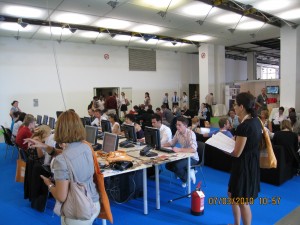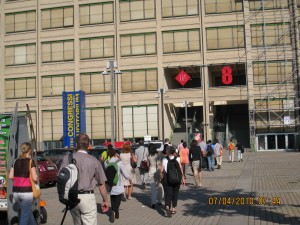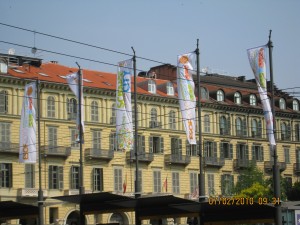Public Affairs Head Jeff Miller is in Torino Italy attending the Euroscience Open Forum. This is the first in a series of dispatches from the conference.
“100 science cafes don’t make new climate change policy.” It was not a message that many in the jam-packed breakout room at Euroscience Open Forum’s first full day wanted to hear. But delivered as it was by Walter Staveloz, director of International Relations for the Association of Science Technology Centers in Washington, DC and former director of the European network of science centers and museums, it was one we couldn’t ignore.
The topic of the session at the sprawling, ultramodern former FIAT headquarters known as Lingotto Congressi, was “Informing and Engaging Citizens on Climate Change Issues.” Predictably, the seats were filled with a mix of journalists, scientists, and public relations types like me—all eager to glean clues on how we can help arrest a disturbing trend: namely, the serious decline in the number of people around the world who believe that human-induced climate change is incontrovertible.
“There is public fatigue with climate change,” says Staveloz, “and we have to ask ourselves why.” Most agreed that the global economic crisis shoulders much of the blame. In the struggle to survive today, tomorrow seems a long way off. But there is more lurking beneath the numbers, or at least that is what I have detected in casual conversations with some in attendance who do not otherwise doubt that global heating is real, dangerous and largely manmade.
To paraphrase, “I have only one life and I don’t like being told that I am a bad guy for wanting to enjoy it.”
This is not the selfish lament that it might first appear. Europeans already pay high taxes on gasoline—and almost everything else—regularly use trains and other forms of public transit for travel, live in much smaller dwellings, forego air conditioning and consume less than Americans in general. Indeed their carbon emissions are actually down slightly from what they were 20 years ago.
Perhaps what I’m hearing about being penalized is purely personal, influenced—at least for those who call Italy home—by national political experience and centuries-long history of conspiracies and corruption. Whatever the cause, these reluctant ones want to be sure that the save-the-planet game is not rigged, that the sacrifice is shared, and that someone is not making a secret fortune in the process.
The difference in perspective shows up in interesting ways. Staveloz reflected on the results of an online climate game, called Clim’City, played simultaneously by 300 global participants during the Copenhagen Conference last October. Europeans who played the game favored international agreements to prompt climate change; American favored economic incentives.

Attendees at the Euroscience Conference in Turin take advantage of the free Internet station in the exhibit hall at Fiat's former headquarters.
In the end, it will likely take both, but before either takes hold, one critically important step remains. “People hate catastrophe messages, “ says Staveloz. “ They won’t listen if they feel powerless.” In short, they need to have a personal action plan and they need to be influenced by the actions of others like them. Only then, the panelists agreed, will we see scientific opinion leaders emerge in local communities in numbers large enough to make policy makers notice.
And what about science cafes? Don’t they play a part? Talking to the already committed – the kind who typically attend a science café — is a good idea for institutions and organizations who want to promote the importance of science. But in Staveloz’ mind, if the goal is to change the conversation about climate, talking to your neighbor might matter more.

